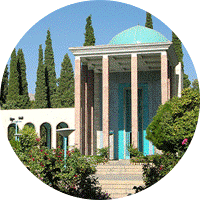Saadi Shirazi
A band of Arab brigands having taken up their position on the top of a mountain and closed the passage of caravans, the inhabitants of the country were distressed by their stratagems and the troops of the sultan foiled because the robbers, having obtained an inaccessible spot on the summit of the mountain, thus had a refuge which they made their habitation. The chiefs of that region held a consultation about getting rid of the calamity because it would be impossible to offer resistance to the robbers if they were allowed to remain.
A tree which has just taken root
May be moved from the place by the strength of a man
But, if thou leavest it thus for a long time,
Thou canst not uproot it with a windlass.
The source of a fountain may be stopped with a bodkin
But, when it is full, it cannot be crossed on an elephant.
The conclusion was arrived at to send one man as a spy and to wait for the opportunity till the brigands departed to attack some people and leave the place empty. Then several experienced men, who had fought in battles, were despatched to keep themselves in ambush in a hollow of the mountain. In the evening the brigands returned from their excursion with their booty, divested themselves of their arms, put away their plunder and the first enemy who attacked them was sleep, till about a watch of the night had elapsed:
The disk of the sun went into darkness.
Jonah went into the mouth of the fish.
The warriors leapt forth from the ambush, tied the hands of every one of the robbers to his shoulders and brought them in the morning to the court of the king, who ordered all of them to be slain. There happened to be a youth among them, the fruit of whose vigour was just ripening and the verdure on the rose-garden of whose cheek had begun to sprout. One of the veziers, having kissed the foot of the king’s throne and placed the face of intercession upon the ground, said: ‘This boy has not yet eaten any fruit from the garden of life and has not yet enjoyed the pleasures of youth. I hope your majesty will generously and kindly confer an obligation upon your slave by sparing his life.’ The king, being displeased with this request, answered:
‘He whose foundation is bad will not take instruction from the good,
To educate unworthy persons is like throwing nuts on a cupola.
‘It is preferable to extirpate the race and offspring of these people and better to dig up their roots and foundations, because it is not the part of wise men to extinguish fire and to leave burning coals or to kill a viper and leave its young ones.
If a cloud should rain the water of life
Never sip it from the branch of a willow-tree.
Associate not with a base fellow
Because thou canst not eat sugar from a mat-reed.’
The vezier heard these sentiments, approved of them nolens volens, praised the opinion of the king and said: ‘What my lord has uttered is the very truth itself because if the boy had been brought up in the company of those wicked men, he would have become one of themselves. But your slave hopes that he will, in the society of pious men, profit by education and will acquire the disposition of wise persons. Being yet a child the rebellious and perverse temper of that band has not yet taken hold of his nature and there is a tradition of the prophet that every infant is born with an inclination for Islam but his parents make him a Jew, a Christian or a Majusi.’
The spouse of Lot became a friend of wicked persons.
His race of prophets became extinct.
The dog of the companions of the cave for some days
Associated with good people and became a man.
When the vezier had said these words and some of the king’s courtiers had added their intercession to his, the king no longer desired to shed the blood of the youth and said: ‘I grant the request although I disapprove-of it.’
Knowest thou not what Zal said to the hero Rastam:
‘An enemy cannot be held despicable or helpless.
I have seen many a water from a paltry spring
Becoming great and carrying off a camel with its load.’
In short, the vezier brought up the boy delicately, with every comfort, and kept masters to educate him, till they had taught him to address persons in elegant language as well as to reply and he had acquired every accomplishment. One day the vezier hinted at his talents in the presence of the king, asserting that the instructions of wise men had taken effect upon the boy and had expelled his previous ignorance from his nature. The king smiled at these words and said:
‘At last a wolf’s whelp will be a wolf
Although he may grow up with a man.’
After two years had elapsed a band of robbers in the locality joined him, tied the knot of friendship and, when the opportunity presented itself, he killed the vezier with his son, took away untold wealth and succeeded to the position of his own father in the robber-cave where he established himself. The king, informed of the event, took the finger of amazement between his teeth and said:
‘How can a man fabricate a good sword of bad iron?
O sage, who is nobody becomes not somebody by education.
The rain, in the beneficence of whose nature there is no flaw,
Will cause tulips to grow in a garden and weeds in bad soil.
Saline earth will not produce hyacinths.
Throw not away thy seeds or work thereon.
To do good to wicked persons is like Doing evil to good men.’




